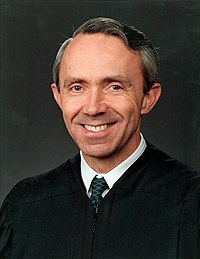
Image via Wikipedia
Minnesota Independent
Norm Coleman should be crying crocodile tears over David Souter's imminent departure from the U.S. Supreme Court. The former senator may yet bring an election case to the nation's high court that relies on the 2000 Bush v. Gore recount ruling. Souter abhorred the Bush v. Gore decision more viscerally than any successor ever could.Related articles by Zemanta
Here's how much Souter despised the Bush v. Gore decision, as recounted in New Yorker reporter Jeffrey Toobin's 2007 book, "The Nine":David Souter alone was shattered. He was, fundamentally, a very different person from his colleagues. It wasn't just that they had immediate families; their lives off the bench were entirely unlike his. They went to parties and conferences; they gave speeches; they mingled in Washington, where cynicism about everything, including the work of the Supreme Court, was universal.
Toughened, or coarsened, by their worldly lives, the other dissenters could shrug and move on, but Souter couldn't. His whole life was being a judge. He came from a tradition where the independence of the judiciary was the foundation of the rule of law. And Souter believed Bush v. Gore mocked that tradition. His colleagues' actions were so transparently, so crudely partisan that Souter thought he might not be able to serve with them anymore.
Souter seriously considered resigning. For many months, it was not at all clear whether he would remain as a justice. That the court met in a city he loathed made the decision even harder. At the urging of a handful of close friends, he decided to stay on, but his attitude toward the court was never the same. There were times when David Souter thought of Bush v. Gore and wept.
Souter was more restrained in his written dissent in Bush v. Gore. More remarkable was that the majority opinion that gave George W. Bush the presidency also famously proscribed using the decision as precedent:Our consideration is limited to the present circumstances, for the problem of equal protection in election processes generally presents many complexities.
Yet in the brief he submitted to the Minnesota Supreme Court on April 30, Coleman cited Bush v. Gore five times.
- Justice Souter: Students Don't Know the Basic Structure of Government (usnews.com)
- Oliver Willis: Obama Must Not Waver On A Souter Replacement (huffingtonpost.com)

![Reblog this post [with Zemanta]](http://img.zemanta.com/reblog_e.png?x-id=fae29e34-e275-476b-ab04-83136ba0929e)

No comments:
Post a Comment